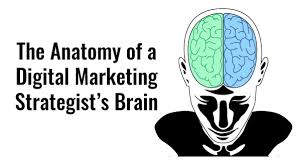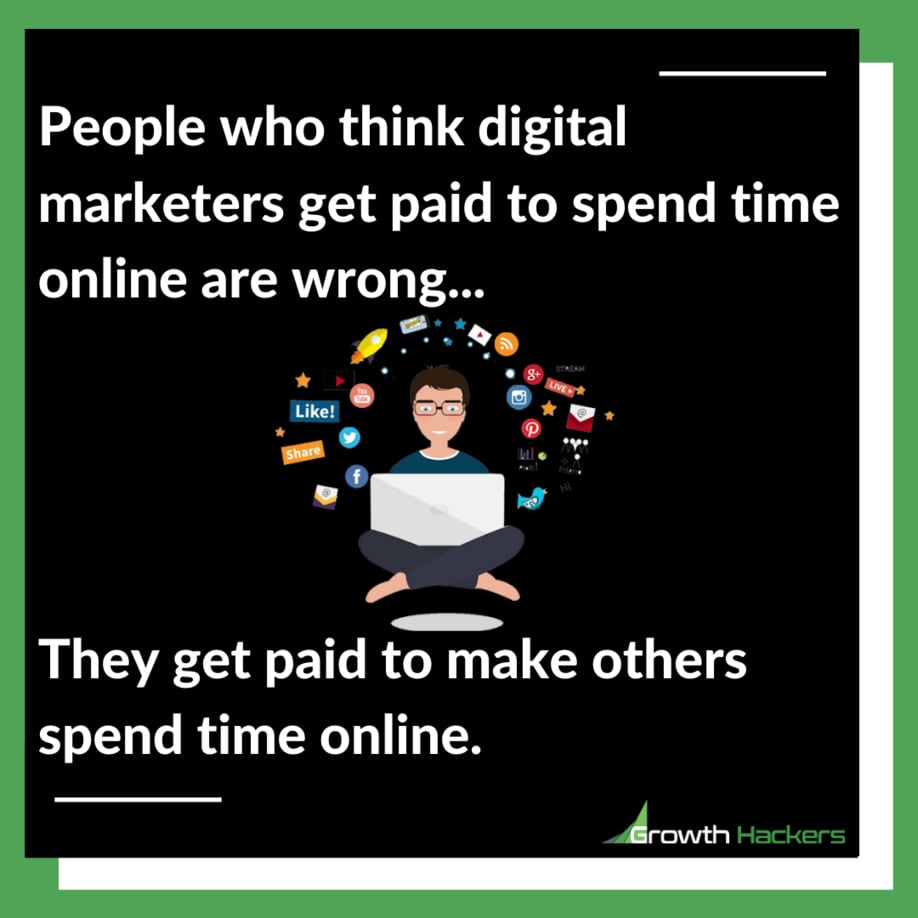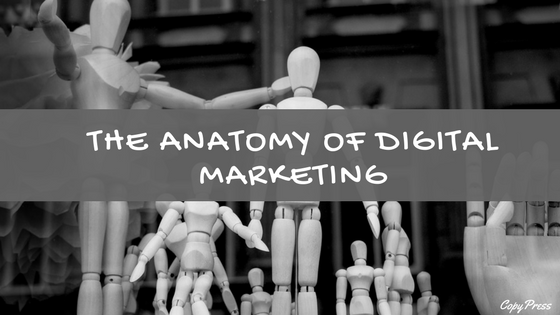Hello!
Most businesses today are aware of the importance of digital marketing, but surprisingly few actually know how to plan, implement and oversee an effective digital marketing campaign. In fact, according to the Content Marketing Institute via an article published by HubSpot, 55 percent of B2B marketers aren’t even sure what content marketing success looks like.
The understanding that digital marketing is worth doing is undermined by this confusion about how to do it, and this results in time, money and effort being wasted on campaigns that don’t produce the paying customers that would justify their existence. Because of this, many businesses end up discontinuing digital marketing and reverting to traditional methods.
When you work on your digital marketing, you need to understand that B2B digital marketing differs from B2C digital marketing. Make sure you adapt your strategy accordingly.
 Now, while traditional marketing absolutely still has a place in your promotional arsenal, some of its methods are outdated, and it just isn’t enough to compete offline.
Now, while traditional marketing absolutely still has a place in your promotional arsenal, some of its methods are outdated, and it just isn’t enough to compete offline.
Leaving digital audiences unaddressed leads to companies missing out on the unrivaled possibilities of online success. This is a particularly threatening notion for startups— per Forbes, traditional marketing often fails startup businesses.
All in all, digital marketing—even if given less attention than it warrants—is crucial for the overall success of any business, and if you’re looking to promote your brand online, you need to learn what a solid campaign involves.
Let’s take a look at the anatomy of a great digital marketing campaign.
The Essential Ingredients
 Any given digital marketing campaign makes use of the same general set of digital tools and media. The specific configurations can vary a little, but since we’re talking about a robust digital marketing campaign for your business, here’s essentially what you should aim to do:
Any given digital marketing campaign makes use of the same general set of digital tools and media. The specific configurations can vary a little, but since we’re talking about a robust digital marketing campaign for your business, here’s essentially what you should aim to do:
- Have a high-quality, accessible, mobile-friendly website with analytics tracking
- Provide a blog with a focus relevant to your industry and targeted topics
- Post semi-regularly on relevant social media channels with actionable copy
- Advertise through relevant PPC channels such as AdWords or X (Twitter) Ads
One of the big strengths of this basic setup is that you can get tremendous ROI relative to traditional marketing for the time you put into creating valuable branded content. Not only can you save an enormous amount of time through immediate and near-limitless digital distribution, but you can quickly rework and reuse your work across different formats.
Where you might otherwise print hundreds upon hundreds of brochures or flyers to send via direct mail, you can create just one ad to use for your website, with your blog, through social media, and in PPC channels. Digital marketing can enhance your business growth completely. You reach a better-segmented audience, save money on the practical aspects of offline marketing, and cut down on production time.
Given the creative resources that go into the fundamentals of finding an effective marketing message, achieving efficiency in the implementation is extremely important. The best digital marketing campaigns squeeze maximum value out of every piece of media they use. Also, don't forget that user experience is essential to digital marketing success.
The Specific Objectives
The importance of knowing exactly why a campaign is being carried out cannot be overstated, but it’s amazingly common for companies to get all the ingredients right—meet the four key actions we just looked at—without having any end goal beyond ‘get more sales’.
A great campaign is fully considered and thought-through before it even begins.
While still in the planning stage, you need to pose, and answer, the following questions:
- What, specifically, are you trying to achieve?
- What metrics will you need to monitor?
- What figures will constitute a success?
- How long will the campaign last?
- How flexible will the schedule be?
 One of the big reasons great campaigns do so well is that they don’t need to stop midway to have emergency discussions about how things are going and whether targets are being met. This ties back to the old adage of working smarter, not harder. If you don’t know where you’re going before you set sail, how can you know if your food stores are sufficient?
One of the big reasons great campaigns do so well is that they don’t need to stop midway to have emergency discussions about how things are going and whether targets are being met. This ties back to the old adage of working smarter, not harder. If you don’t know where you’re going before you set sail, how can you know if your food stores are sufficient?
Once you’re done, you need to be able to look back, review the full duration of the campaign, and reach a conclusion about how effective it was, what you gained from it, and whether it’s worth repeating that strategy. If you can’t meaningfully assess the results of a campaign, then you can’t usefully comment on it at all.
Most outstanding digital marketing campaigns are the products of iteration. One test campaign begets another, and then another, and so on, with each campaign building upon the methods of the last. If you take out the analytical precision, that process simply cannot function.
The Practical Tools
Digital marketing requires digital technology, and since that varies in a million big ways, you need to know what tools you’re going to be using to deliver your campaign.
The tools you pick will affect how long it takes you to achieve particular tasks, influence the quality of your content, and draw from your budget.
Consider these questions:
- What software is suitable for your requirements?
- Do you have the hardware you need?
- Does anyone working on the campaign need training?
- What support is available?
- What’s the order of priority?
 In answering them, you may identify possible efficiency savings such as using convenient plugins and data tracking tools to automate your digital marketing campaign management. A marketing dashboard will help you ensure campaigns stay on track at all times through bringing together the varied elements, goals, and deadlines.
In answering them, you may identify possible efficiency savings such as using convenient plugins and data tracking tools to automate your digital marketing campaign management. A marketing dashboard will help you ensure campaigns stay on track at all times through bringing together the varied elements, goals, and deadlines.
Think about how the technology decisions you make today will affect your campaigns of the future. No one wants the pain of expensive integrations a few years down the line, so it’s best to opt for tried-and-tested solutions. For example, if your site was set up as a webshop on Shopify, a lot of the marketing elements will come as part of your subscription — but you can also go down the free route and use open-source marketing software instead of paying for a license.
Given the massive role that digital tools play in the day-to-day operations of a digital marketing campaign, it’s best to set aside plenty of time to do some serious research before you get started. For some extra information, try reaching out to colleagues, peers and/or industry figures to find out if there are any powerful new tools you should be taking into consideration— you may find that a fresh software release could be just what you need to save a lot of time and money.
The Target Audience
Knowing who your target audience is and who your ideal customer is are among the 8 most effective B2C and B2B digital marketing strategies you can apply. You should always start with this. Every campaign needs a target audience, or else it’s just firing content out at random (which isn’t exactly an effective tactic). There’s a reason why email marketing is built around the painstaking cultivation of high-quality address lists.
 Ask these questions about the people you want to reach:
Ask these questions about the people you want to reach:
- What do they have in common?
- What are their demographics?
- What are their interests?
- What are their cultures?
- Where are they located?
- How much money do they make?
- What digital channels do they use?
Even if you’re an established business and you think you know everything about your audience, take the time to do some research. Conducting a marketing audit will help you shape your digital marketing strategy. You might be surprised to discover that there’s still more to learn about the people you’re trying to sell to.
If you follow our blog often, you'll know that knowing your target audience is so important. This is part of the entrepreneur's anatomy to be able to analyze and gauge your market.
The Right Messages
Knowing your audience is critical, obviously, but you then need to reach them, and the actual execution of that is of paramount importance. You must craft the messages you want to send, and figure out when, where and how you want to distribute them. You also need to ensure that each one appropriately reflects your brand image.
Depending on the level of segmentation in your target audience, you may need one set of messages or a large number of them.
 Answer these questions for each segment:
Answer these questions for each segment:
- What tone of voice will resonate with them?
- Which platforms will be most cost-effective?
- When will they be most receptive?
- Which formats will they pay most attention to?
- What pop-culture references will they get?
Imagine that you’ve identified middle-aged men as your target audience. They’re unlikely to use Snapchat or Instagram, so there’s little point in targeting them there. They also probably won’t respond well to teenage social media slang terms. Context has a huge impact upon the influence of your messages.
The Necessary Commitment of a Great Digital Marketing Campaign
If you’ve managed to put together all the other components of a great digital marketing campaign, this is the very last thing you need to add to the mix, because the best plans with the best of intentions can amount to nothing if those responsible for the execution don’t have the opportunity to follow through.
If you don’t think you can get the time and resources to do a full digital marketing campaign properly, it might be better to leave it for the moment. It depends somewhat on the structure of your business.
If you have to report to upper management, and deal with probing questions from the CFO, then hold off on the idea until you can give it the attention it needs. A failed half-baked campaign could sour them on the idea and make it harder to get approval for a full campaign later.
If you’re at the head of the operation, on the other hand, then tinker at your leisure— just be aware that you’re unlikely get anywhere until you take it seriously!
Thank you!
Subscribe to our newsletter! Join us on social networks!
See you!






